
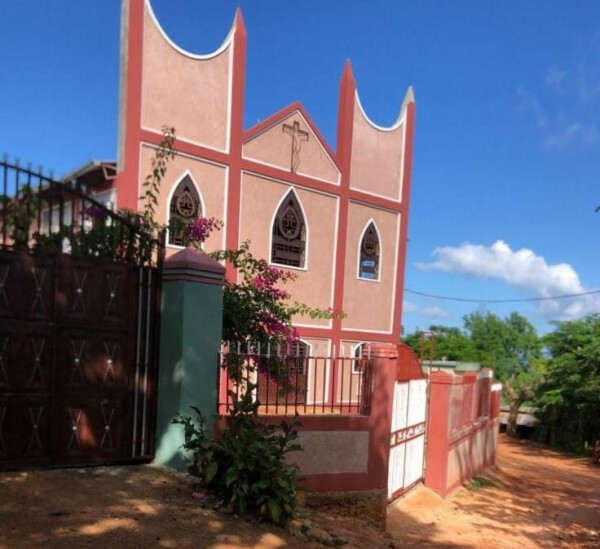 St. Marc Episcopal Church in Jeannette has a new coat of paint!
St. Marc Episcopal Church in Jeannette has a new coat of paint!
Last quarter, we featured programs in Jeannette, Haiti, answered your questions, and told you how grateful we are for your generous donations that continue to support St. Marc School and Clinic, and the new Cassava Program. Our gratitude continues this quarter as we share personal greetings from friends in Jeannette, provide an update on St. Marc School and Clinic and the Cassava Programs, and invite you to set up an informational Zoom meeting for your parish, outreach committee, or other interested group.
A personal note from Cathy Parrill, Haiti Partnership consultant:
Maybe you, like me, have become discouraged lately about the dire situation in Haiti. Severe food shortages, with 1.4 million people categorized as Level 4 (emergency) and nearly 3 million more categorized as Level 3 (crisis). Gender-based violence. Most of the capital city under gang control. Displaced families with nowhere to go. How long can people go on like this, I asked myself. I was beginning to lose hope. And then, I received the following messages from our friends and partners in Haiti. Please read to the very end and see what our partners in Haiti would like for you to know.
Greetings from Père Moise
 Père Moise and Family (L to R: Magalie, Moe, Anne, and Père Moise)
Père Moise and Family (L to R: Magalie, Moe, Anne, and Père Moise)
“We thank God very much, for the way he is watching over us and has kept us safe. We say thank you to all our friends in the USA, who never let us down, even in our difficult times. Hats off to you. I want to take this opportunity to tell you, although times in Haiti are difficult, we are happy to say that St. Marc institutions are still functioning: the church, the school (all sections), and the clinic.”
“Despite news you may have heard about the insecurity in Haiti, we are happy to report that St. Marc has not had to close like so many institutions in cities. We always do something to stay standing, so that the community can get the services they need. Life is not without problems, but despite all the difficulties, with the support of our friends in the USA and the will of the people who are working here, we still remain eager and hopeful. [The] Jeannette community, members of the church, and I salute you for your courage and faithfulness to this partnership. We hope that one day soon, Haiti will have peace so that you can visit, and we can see each face to face again, other with happiness.”—Père Moise
St. Marc School and Clinic
Although many city schools have been forced to close at times because of the political situation, St. Marc School and Clinic remain open as usual. Your support is providing an excellent education to over 400 young people and healthcare to the region.
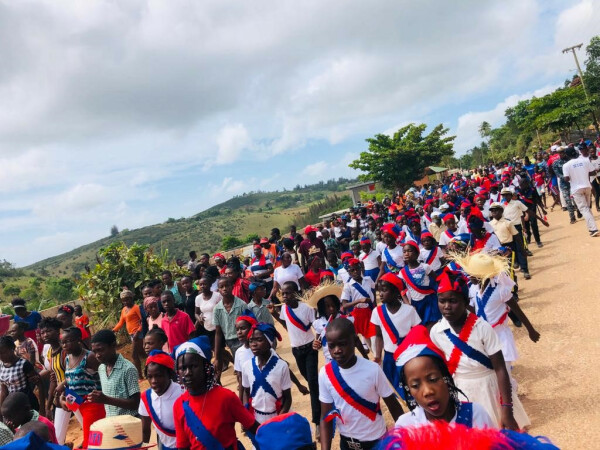 St. Marc students in the parade!
St. Marc students in the parade!
Personal Messages from Others in Jeannette
We received a perky voice message this week from, Mary Kam, a 75-year-old friend who has lived her whole life in Jeannette and used to help cook for American visitors there.
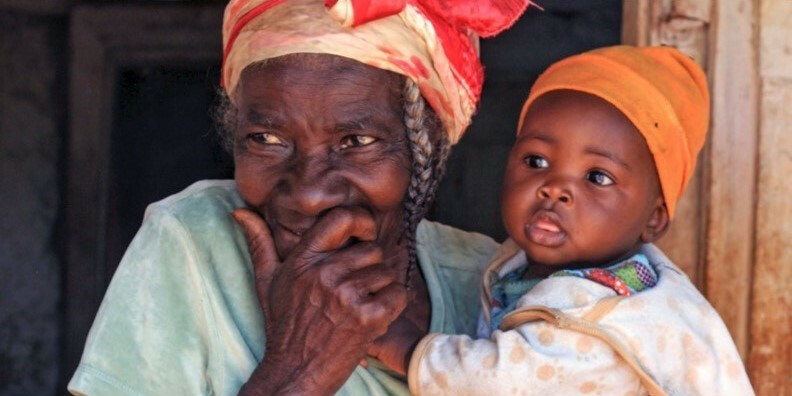 Mary Kam and great-grandchild
Mary Kam and great-grandchild
“How are you and your family?” Mary Kam asked. “I never stop thinking of you. When will you be back to see us?” she asked. “How are Mary Alice, Nancy, Ted, Madame Ted, Denis, and all my other friends?” she wanted to know. Mary Kam said that although she has the normal aches and pains of a woman her age, she is doing well. She prays for us. Please pray for her, her family, and their neighbors in Jeannette.
Dr. Elie, who worked at St. Marc Clinic until he resigned at the end of 2023, messaged to say he and his wife Dayanne are in France with her relatives and doing well. In a letter to Ellen Alison, who, along with others from the Diocese of Eau Claire, has been an instrumental supporter of St. Marc Clinic for years, Dr. Elie wrote:
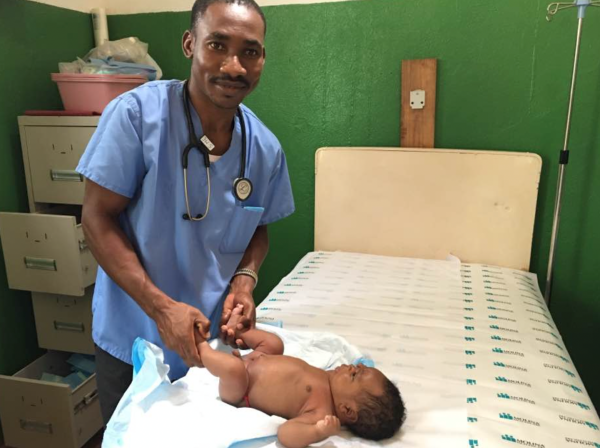
Dr. Elie Martin and his young patient
“I won't ever stop feeling grateful, especially to you, Ellen, for the time I spent working for St. Marc's, where I spent seven years practicing my profession as a doctor. I learned a lot collaborating both with the leadership at St. Marc's and the team overseas with HP [Haiti Partnership]. We learned from your strong sense of values, from your team's medical knowledge, and from your discipline. We learned how important it is to build strong relations with patients, colleagues, and the managers we work under.
"It was good for the health of the people Jeannette, but also for a young man fresh out of medical school. You took me on even though I did not yet have any experience at all. You chose me anyway. And the work you gave me enabled me to move forward in my life, socially and economically. And what you and HP did for me will keep helping me as I make a new start.”—Dr. Elie
In a conversation with Eloi, a long-time leader in Jeannette, I wondered aloud how a lasting solution to the political instability and humanitarian crisis in Haiti would ever be found, and whether the relatively small amount we are doing can make a meaningful difference in the face of the enormous problems Haiti faces.
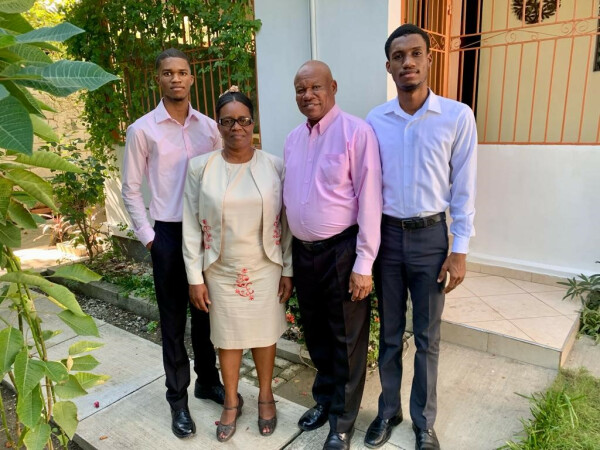 Family of Rodolphe Eloi (L to R: Antoine, Mireille, Eloi, and Jacob)
Family of Rodolphe Eloi (L to R: Antoine, Mireille, Eloi, and Jacob)
“When we arrive at the end of our lives,” Eloi reminded me, “The money we have made and possessions we have acquired are as dust. What matters is what we have done in communion with our brothers and sisters, and what we leave behind for the next generation.”
Cassava Program Update from APSHA
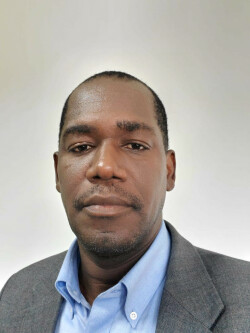 Gregory Leger, CEO of APSHA
Gregory Leger, CEO of APSHA
Update from Gregory: The Cassava Program is being implemented in Jeannette even though the situation in Haiti has required us to change strategy and tactics and to stay flexible. When it was time for trucks to deliver the cassava cuttings that we will use to plant in Jeannette, roads to the supplier in Cayes were impassable because of gang activity. We had to find a different source in a place that was accessible. We found another source.
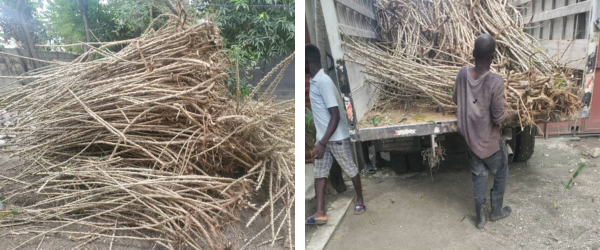 Cassava stalks, ready to be transported and turned into cuttings for planting
Cassava stalks, ready to be transported and turned into cuttings for planting
Then, that road was closed to truck traffic, so we hired motorcycles to transport the cassava stems across the peninsula to Jeannette.
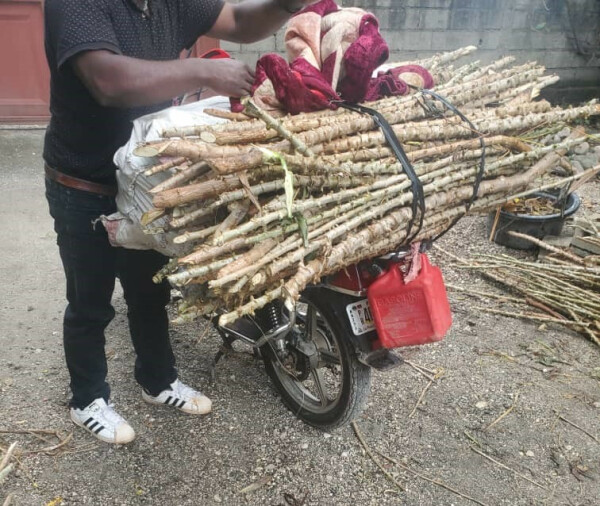 Cassava cuttings being delivered by motorcycle
Cassava cuttings being delivered by motorcycle
That cost more money than the original plan, but we did not request an increase in the budget. Instead, we modified the plan, reduced other expenses, and are now training farmers in Jeannette how to turn the stalks into cuttings that will soon be growing in their soil. So that problem is solved too.
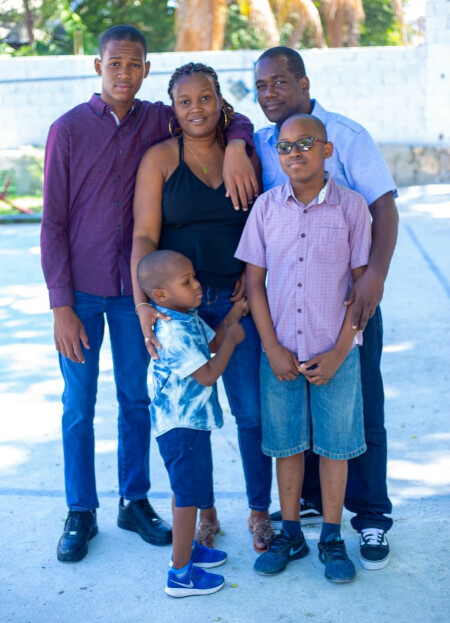 Gregory Leger with his family: wife China and their sons Max (14), Kevin (10) and Gregory Jr (4)
Gregory Leger with his family: wife China and their sons Max (14), Kevin (10) and Gregory Jr (4)
A week ago, news from Haiti was wearing me down. I was beginning to lose hope. And then conversations with our Haitian friends reminded me that, as long as there are people like them in Haiti, we have every reason to hope. We Americans have indeed been blessed to be in partnership with our friends in Jeannette for all these many years. May we be as much of a blessing to them as they are to us.
I would be pleased to meet with your parish, outreach committee, or other interest group over Zoom to provide you with more information about the Haiti Partnership and the current situation in Haiti. To arrange a time, please contact me at
.
–Cathy, Haiti Partnership consultant
To donate to St. Marc School and Clinic or to the Cassava Program, you may give online or mail a check to the Episcopal Diocese of Milwaukee with "Haiti" on the memo line (mail to 804 E Juneau Ave; Milwaukee WI 53202).


 St. Marc Episcopal Church in Jeannette has a new coat of paint!
St. Marc Episcopal Church in Jeannette has a new coat of paint!  Père Moise and Family (L to R: Magalie, Moe, Anne, and Père Moise)
Père Moise and Family (L to R: Magalie, Moe, Anne, and Père Moise) St. Marc students in the parade!
St. Marc students in the parade!  Mary Kam and great-grandchild
Mary Kam and great-grandchild
 Family of Rodolphe Eloi (L to R: Antoine, Mireille, Eloi, and Jacob)
Family of Rodolphe Eloi (L to R: Antoine, Mireille, Eloi, and Jacob) Gregory Leger, CEO of APSHA
Gregory Leger, CEO of APSHA Cassava stalks, ready to be transported and turned into cuttings for planting
Cassava stalks, ready to be transported and turned into cuttings for planting Cassava cuttings being delivered by motorcycle
Cassava cuttings being delivered by motorcycle Gregory Leger with his family: wife China and their sons Max (14), Kevin (10) and Gregory Jr (4)
Gregory Leger with his family: wife China and their sons Max (14), Kevin (10) and Gregory Jr (4)

